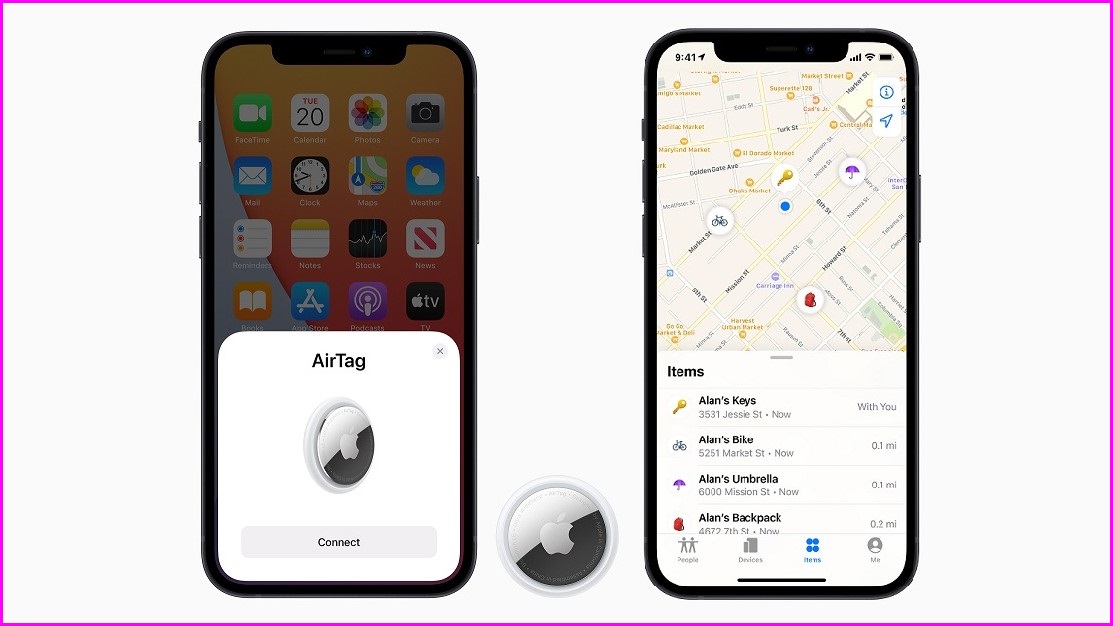Recognising that its diminutive new AirTag would be a favoured tool for those wanting to track someone’s movements without their knowledge, Apple has designed the devices with features that will alert users if someone may be using the devices to follow them.
Released as part of the company’s major ‘Spring Loaded’ product launch, the long-rumoured $45 AirTags bring Apple into a digital-tracker market that was pioneered by firms like TrackR and Tile, whose range of trackers come in a variety of sizes, shapes, and colours.
Apple’s AirTags work by regularly broadcasting Bluetooth signals, which can be detected by any compatible phone within a few metres. The GPS location of that encounter is then relayed anonymously back to the owner’s account, where the devices’ locations can be stored and tracked over time.
At short range, the new Precision Finding feature also leverages Apple’s U1 Ultra Wideband (UWB) chip – built into late-model iPhones – to tell you exactly how far, and in which direction, your keys or other devices are located.
Outside of the home, the trackers rely on crowd-sourced networks of other people’s phones, with accuracy directly related to the number of compatible devices the tag passes in public spaces.
That could give AirTags a massive built-in advantage: with more than 1 billion iOS devices in the market – Apple Australia sold 2.1m iPhones in just the second half of last year alone – the reach of its Find My network means AirTags are likely to be much easier to find than Tile devices, of which just 10 million have been deployed around the world.
Statistically, it’s going to be pretty hard for an AirTag to go off the grid – which is great when you misplace your keys or your bike is stolen, but raises entirely different issues when a 32mm-diameter AirTag is secreted in a bag, pocket or car without the owner’s knowledge.
AirTags are “designed to discourage unwanted tracking”, the company’s marketing materials note, touting privacy features that will raise an alert if an iPhone notices that someone else’s AirTag is being regularly found nearby although its owner is not.
A built-in speaker has been designed to start making noise if early warnings are ignored, or if the unknown AirTag hasn’t been found yet. Tap the tag with your phone, and it can tell you who it belongs to – and how to reach them.
Location, location, location
For all their utility, concerns that readily-available trackers are incompatible with privacy – and potentially even dangerous to individuals’ safety – have been simmering for years.
Their easy access and invasive design raised alarm bells with privacy advocates and domestic-violence campaigners, who for years have been ringing alarm bells about the extensive use of poorly-regulated location-tracking, ‘stalkerware’ apps, and other technologies that can be used to follow people’s activities online and off.
A growing number of security firms – and, this month, no less than Interpol – have thrown their weight behind the Coalition Against Stalkerware, a grassroots effort that is trying to improve education about stalkerware and define industry best practices around “potentially unwanted technologies deployed without user consent.”
A recent survey by Wesnet, a women’s services network and Australian CAS member, found that 99.3 per cent of respondents reported experiencing “technology-facilitated stalking and abuse”, with use of GPS tracking apps increasing by 131 per cent between 2015 and 2020.
CAS member and security vendor Malwarebytes reported a 780 per cent increase in detection of monitoring applications during the first half of 2020, and a 1,677 per cent increase in spyware detections.
Kaspersky Lab has also been a vocal advocate against spyware and recently released an open-source Wi-Fi sniffer called TinyCheck, capable of detecting the suspicious communications typical of stalkerware.
Yet privacy violations aren’t always so overt: a significant recent court decision ruled that Google had misled millions of Android users about the degree to which it collected location information, and how they could disable that tracking if they wanted to.
That information was being aggregated within the users’ Google account to better calculate map directions, travel times and other movement-related information – but the internal records could also prove dangerous by revealing a victim’s movements to any individual who could access their Google account.
Last year, Tile and Apple – whose CEO Tim Cook has been vocal about his support for user privacy – were caught in a stoush over privacy when the phone maker turned off third-party location tracking by default but left its own tracking enabled.
A fortnight before launching the AirTag, Apple formally opened its Find My network to certified third-party apps and devices; they can now use the network to interact with AirTags and other registered devices, while respecting the controls it has put in place.










